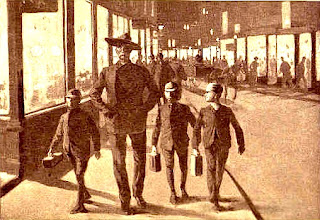Not quite a novel, Lin McLean is a series of stories centered around its title character, a young cowboy learning the lessons of life. Cowboys had been shooting up the Wild West in dime novels for decades. With Lin McLean, Wister reintroduced him to mainstream popular fiction as a three-dimensional character.
Reinvented. Lin McLean first appeared in 1892 when Harper’s Magazine published Wister’s story “How Lin McLean Went East,” which was later to be the opening chapter of the book. Wister, the product of European schooling and a Harvard education, knew the West from frequent travels there. He had a writer’s gift of observation and the ability to reproduce in words the types of men he found there.
If you’ve ever met cowboys, you recognize them in the manners, speech, and attitudes of Wister’s men on horseback. Call it a mix of hell raising, reserve, deep sentimentality, and arrested adolescence. Among Easterners at the time, “cowboy” meant “outlaw.” Wister cast his hero instead as a hard-working, fun-loving “cowpuncher.”
 |
| Lin McLean |
Meeting a railroad restaurant waitress, he decides in haste to marry. It’s a bad match, but he’s saved by the discovery that she’s already married to another man, Mr. Lusk. She returns to her husband, leaving McLean something of a laughing stock on the range.
Spending a lonely Christmas in Denver, McLean meets a bootblack, Billy, who turns out to be a runaway from the Lusk household. Concerned for the boy, he takes him along back to Wyoming. The arrival of a girl named Jessamine from Kentucky has McLean considering marriage a second time.
This plan is derailed when she learns he’s been married before. Mrs. Lusk makes a dramatic exit with an overdose of laudanum, and McLean, his bride-to-be, and Billy are finally happily together in the last scene.
 |
| Lin McLean in Denver with the three bootblacks |
Impulsive and not good at considering consequences, McLean is, nonetheless, indomitable. Life’s sorrows may blunt his high spirits, but he remains undefeated. He is not carefree, but he can take pleasures where he finds them. There is the love of Billy, the friendship of his fellow cowboys, and the solace in the farmstead he acquires and begins to improve.
 |
| Governor Barker, Billy, and Lin McLean |
A special case is Drybone, an abandoned Army post from the days of Wyoming’s Indian Wars. Here the officers’ quarters and commissary have been turned into a saloon, dancehall, and hotel for gamblers and whores. The post cemetery is now a place of disposal for the bodies of men and women who arrive but, due to mischance, never leave.
The nightly revels are to Wister a kind of sacrilege, as he recalls those who once lived here in service to their country during troubled times. There is dark irony in his remembering the Indian Wars and the shifting War Department policies meant to benefit arms dealers with friends in the Department of Interior. He observes grimly that good men and women died in this remote outpost as a result of self-serving decisions made in Washington.
 |
| Owen Wister |
When a young Texas cowboy wipes his mouth on the tablecloth and tries gamely at conversation, he is reprimanded for lack of manners “in the presence of a lady.” When he leaves the table in a huff, the brief exchange of comments among the remaining diners is priceless.
Wrapping up. Wister was one of the best educated and gifted of early western writers. It says something that while at Harvard he was editor of various publications including the Harvard Lampoon.
With Lin McLean, he created the basic cowboy character who would populate western fiction until the present day. The Virginian would then take him the next step. There the cowboy deals with a true villain, and their differences have to be settled with guns. With that gun duel at sundown and the demise of Trampas, we’re on our way.
Lin McLean is currently available free online at google books and for kindle
Picture credits:
Illustrations from the novel by Frederic Remington
Photo of Owen Wister, Wikimedia Commons
Coming up: Old West glossary no. 17

Makes me want to go out and get a copy!!
ReplyDeleteI love the embossed design on the front cover! I actually have never read Wister (shamefully), but I was looking for his books just this week when I was at The Strand.
ReplyDeleteThanks for sharing, Ron!
As an enthusiastic novice when it comes to Westerns, I was thrilled to read this... very educational and highly entertaining. Thank you!
ReplyDeleteWow! You know...I don't think I've ever heard of this. Thank you for the post!
ReplyDeleteAt the University of Wyoming they publish The Owen Wister Review.
ReplyDeleteRead it for the first time this summer. Takes a bit of time to get used to Wister and his turn of the century style, but for an old guy like me they are quite good.
ReplyDeleteCheyenne, it's online; you don't even have to leave home.
ReplyDeleteCullen, the list of authors I haven't read yet would fill a book.
Heath, good to know.
Richard, you are welcome.
Gina, thanks. I need to look into that.
OGR, I agree.
Thanks, good review. I loaded Lin McLean onto my Kindle, but haven't got around to it. Now I will. Unlike many, Wister and Mark Twain (Roughing It) wrote about a West they actually experienced.
ReplyDeleteterrific author and books. some good belly laughers. list me more such authors, please sir!
ReplyDeleteI seen your blog post yesterday morning and i also are actually analyzing this item on a normal schedule. You’ve substantial amount of tips correct here so i take pleasure in your thing of an web presence absurdly. Maintain the actual great jobs! frozen yogurt
ReplyDeleteYou should take part in a contest personally of the highest quality blogs on the net. I’ll suggest this great site! taco time
ReplyDelete